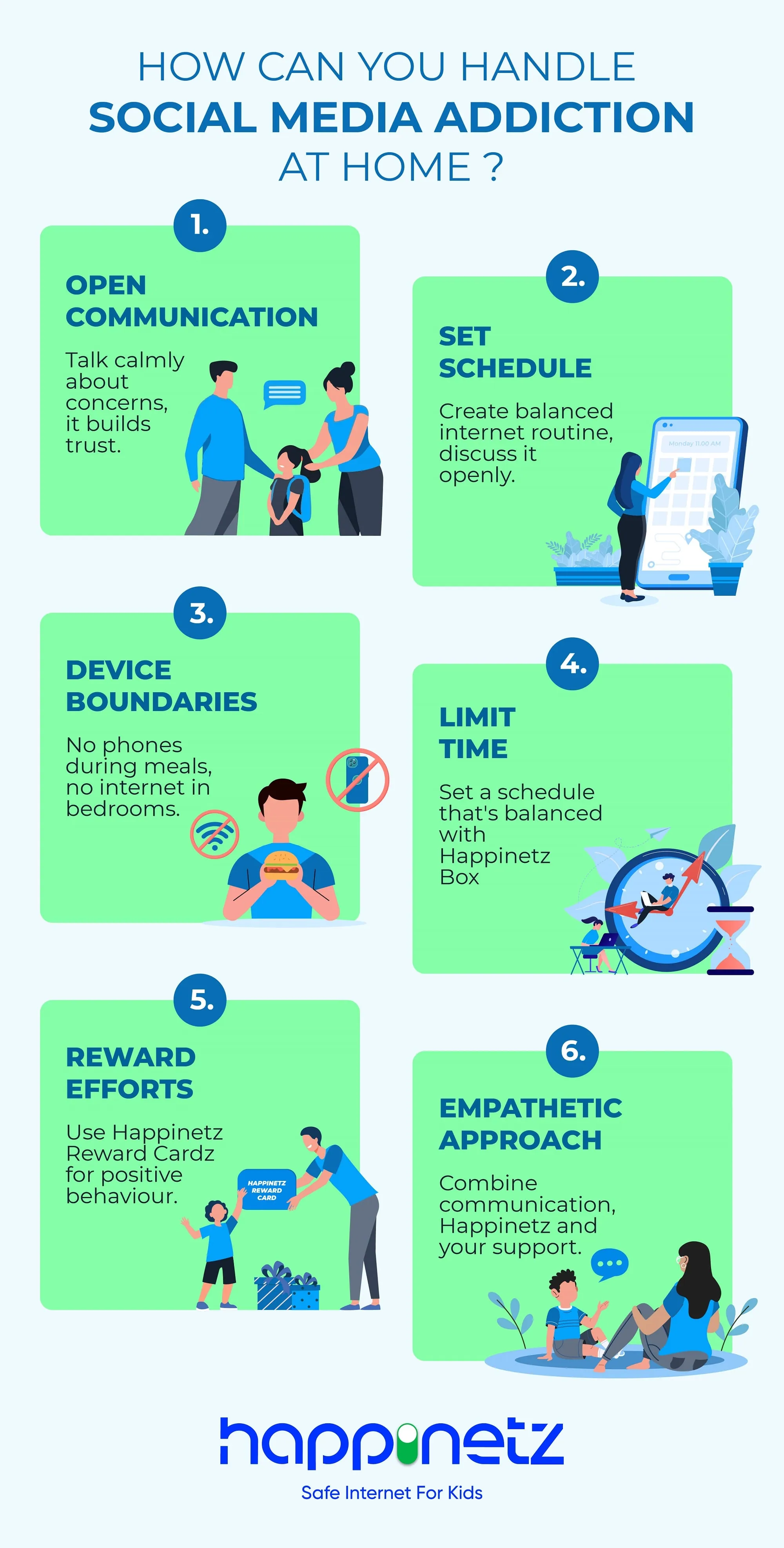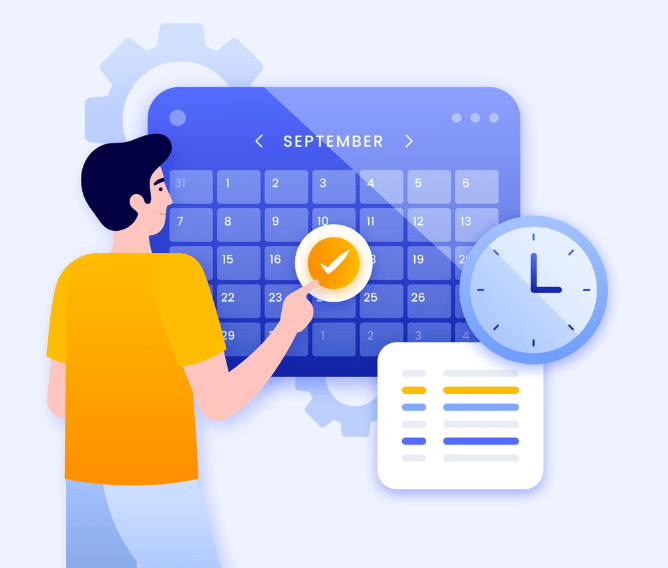Your teen is busy. They usually are, with studies, hanging out with friends, keeping up with the trends and exploring their potential. In our world, busy is good. Adults chase that feeling of satisfaction of being at something all day long, even though we don't stop to assess the impact or the effectiveness of our efforts. Our children emulate us and as they are on their way to becoming individuals in their own right, with independent opinions and viewpoints, this 'busyness' can be a badge of honour.
But what are they busy with? Parents lament that teens and young adults spend a huge chunks of their day online, especially on their phones, heads bent, a look of concentration and sometimes boredom, but scrolling away nevertheless. Is it social media addiction?
According to Pewresearch, about three-quarters of teens visit YouTube at least daily, including 19% who report using the site or app almost constantly. A majority of teens (58%) visit TikTok daily, while about half say the same for Snapchat (51%) and Instagram (50%).
It's a digital world alright but is that 'too much' actually an addiction?
What is social media addiction
Of all the online time spent online, quite a bit of it is on social media , whether as an active or passive user. Real research, an online survey app launched a survey on teenagers using social media in 2022. Over 38% respondents said that teenagers spend more than 8 Hours on social media daily.
An unhealthy dependency on social media is considered addiction. There is a thin line between enjoying something and using it every day to being addicted to it. Admittedly we don't have clear cut numbers yet that let us demarcate what constitutes an addiction but if you are concerned about your teen, pay attention to physical (neglect) and mental (distress) health.
Why is social media addictive
Experts say that using social media can lead to physical and psychological addiction as it triggers the brain's reward system to release dopamine, the 'feel-good' chemical. Notifications, likes, retweets, comments on social media lead to an increase in dopamine levels. Your brain wants to replicate the feel-good experience, so you reach for social media again and again.
Teens and young adults are prone to being addicted to social media. It is because they need validation, are impulsive, looking to grow social interactions and be part of groups.

What does social media addiction look like
While we cannot say a teen or young adult has social media addiction only on the basis of the number of hours they spend, there are some markers that point towards the habit being harmful.
- There is negative effect on their schoolwork. You might notice falling grades or incomplete homework. There may be lesser enthusiasm for school assignments and activities.
- Increased use of devices during other activities such as meal times, being with friends or being distracted during family conversations
- Irritability and restlessness when they are not using their device or being away from social media during family trips, at the movies etc
- Angry rebuttals when ever an adult or parent brings up their increased presence on social media
If you see these signs in your teen, it's time to reduce social media usage. It may need the parent's attention and greater involment in their teen's life.
Negative impacts of social media addiction in teens and young adults
Teens use social media for entertainment and self-expression. However, with no real limits, either self-imposed or otherwise leads them to spending a lot of time on these social media platforms. The way these platforms are designed, every action and interaction rewards them so that people stay longer.
However, excessive usage can lead to distraction, disrupting studies and sleep patterns. They may develop unrealistic views of other people's lives and reduced real life social interactions can hamper their development and coping skills. It can also expose teens to bullying and rumour spreading.
How can you handle social media addiction at home
Some ways in which you can tackle social media addiction are:
Voice your concerns
Talking to your teen is one of the best ways for the communication to flow. Teens and young adults are notoriously difficult to talk to, especially when it comes to awkward subjects but they are your child and only you can guide them through difficult phases with wisdom and calm.
Take out more time where you can talk to them one-on-one. Even if you get grunts or monosyllables or vague responses to what you are asking them, it still sends out the signal that you are around as a parent and that they can trust you to be there when they need you.
You can make neutral observations about your concerns on them spending more time online. Don't bring it into a confrontational space and really listen to what they say.
Have a daily schedule
Set a daily internet schedule for your teen. It would not happen overnight and you may face initial resistance.
If you haven't really addressed device and internet usage at home, do so now. Talk about balanced tech usage and make sure you model that behavior. Discuss social media addiction and its negative impact. If you don't set an example for your teen, your conversation may be considered empty words by your teen.
Also set boundaries around device usage. For example, checking the phone during meals can be a strict no-no. You can also ask them not to access internet in their bedroom.
Limit screen time
Ask your teen how much time they need to be online, set a schedule that's balanced, and that they agree to and stick to it. Make exceptions now and then to not make it very harsh on your teen.
Mostly teens feel resentment at these limits so you can use a tech device that does the scheduling and shutting down the internet for you.
Using a Happinetz Box would make it easier for you to set a schedule based on your teen and young adult's academic and entertainment needs. Set the daily schedule once and you don't need to monitor the device or your teen. It also downplays any confrontations that you night have around internet usage as the system is taking care of the schedule.
There's the option to extend the time limit as and when you need to. Since your teen needs to ask you to make the exception you can be aware of the reason and the need, paving the way for more conversations around right usage.
Reward good behaviour
Remember that you and your teen are on the same side. Every little effort that they make towards reducing their screen time or even adhering to the guidelines you have set down is a win. Recognise the win. Reward them.
You can bring excitement to this process of recognising that they are making an effort. Use Happinetz Reward Cardz that come with your Happinetz package to bring that element of surprise and wonder to rewarding your teen. After all every teen is an overgrown kid still trying to find their way.
All you need to do is draw a card every time your teen has been adhering limits for 3 days in a row. Your Happinetz App will remind you, so you have 1 less thing to keep track of. These cards have prompts and everyday rewards that make your teen feel special and rewarded.
Social media addiction in teens and young adults can be managed with love, understanding and communication. You can use tech to wean your kids off excessive tech usage and have them in the best physical and mental space they deserve.
FAQs
- What is the effect of social media addiction?
Social media addiction in teens and young adults has been linked to depression, anxiety, substance abuse and poor body image.
- How many hours do teens spend on social media?
According to recent research, teenagers spend 7+ hours per day in front of screens. That equates to mire than 40% of a teen’s waking hours.
- What are the signs of social media addiction?
- Spending a large amount of time on social media
- Thinking about social media even when you’re not using it
- Reduced time for other activities in order to use social media
- Reduced real-life social interactions in order to use social media
- Social media usage impacts areas of your life, like studies, family time and relationships
- Experiencing anxiety or feeling irritable when you can’t use social media
- How do you break the cycle of social media addiction?
- Set time limits
- Be aware of your triggers that lead you to use social media
- Find other activities that can replace social media usage, preferably hobbies or spending time with family and friends
- Set social media boundaries at home, such as not using it in the bedroom or not accessing certain platforms
Happinetz can help you break social media addiction in teens. To know more about the product, click here.




